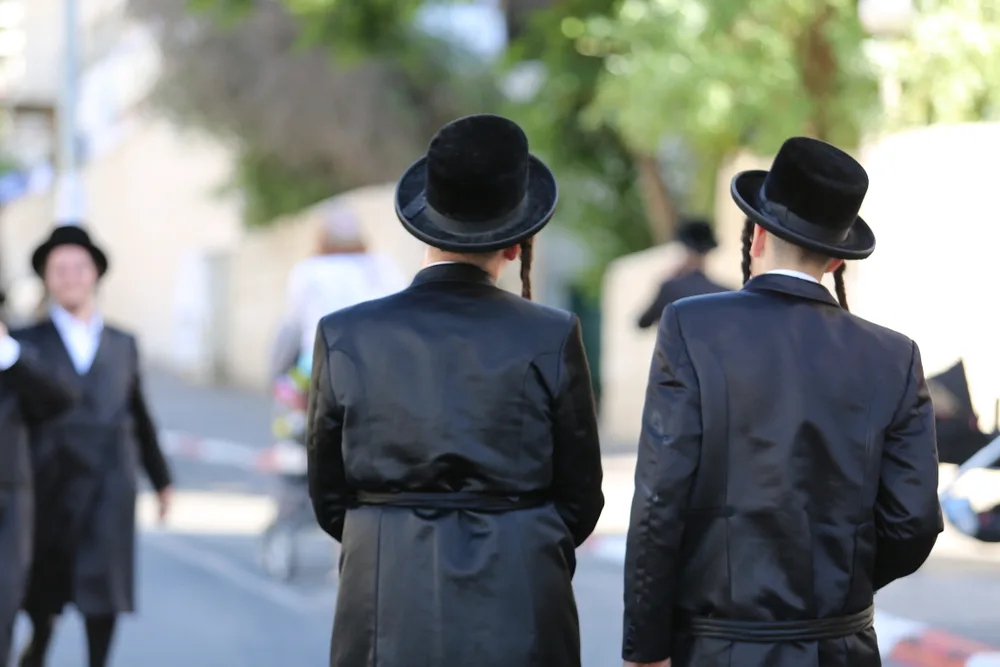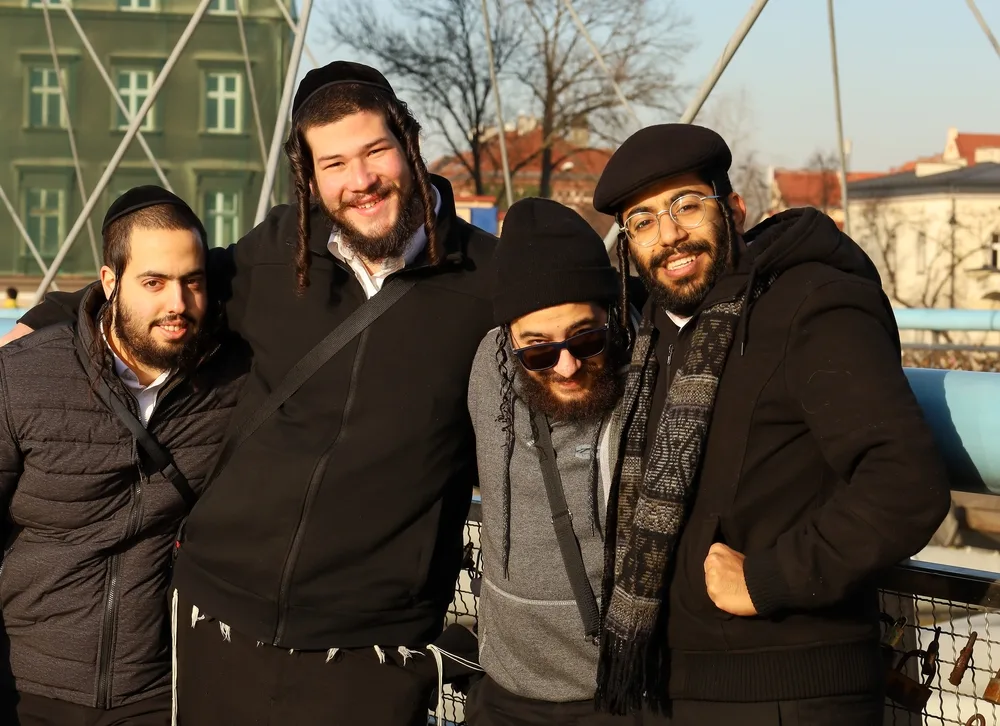Jump to:
Whether there is a temple in your neighborhood or you’ve gone to a Chassidic bakery for Lekach (honey cake), you may have noticed that many Jewish people have curly hair, typically ranging from loose coils to tight kinks, or 3a to 4c.
But why exactly do Jewish people have curls? The answer to that question is less straightforward than you may think. You may even need to reframe the question to get the answer. Read on to learn why.
Do All Jewish People Have Curls?
Curly hair is not a universal trait of Jewish heritage or culture. Many Jewish people have curly or wavy hair because of their middle eastern ancestry, but hairstyle or type does not dictate ethnicity or religious beliefs.
Some Jewish people follow sects of Judaism that require specific kinds of dress, but you should never assume someone is Jewish based on their hair. Curly hair is a genetic trait dictated by the shape of a person’s hair follicle and the asymmetrical production of hair proteins.
The more curved a person’s hair follicle, or the more asymmetrical the production of hair proteins, the more curly a person’s hair is. Most people with curly hair have a combination of an irregularly shaped hair follicle and asymmetrical hair protein production.
Because the quality of being Jewish gets often defined by culture and ancestry rather than simple religious practice, Jewish people tend to share more physical traits than followers of other faiths that are less ethnically and culturally defined.
Jewish people that marry Jewish people typically express the genetics for curly hair because the Jewish ethnicity has been prone to express the genes that code for curly hair. However, not all Jewish people have curly hair, and not all Jewish people are Jewish by ancestry.
The Role of Curly Hair in Jewish Culture

David Cohen 156/Shutterstock
Judaism has three branches: Orthodox, Conservative, and Reform. However, there are many forms of Judaism. One Jew’s interpretation of Conservative Judaism may differ from another because there are no strict attributes that define what does and doesn’t belong in a branch of Judaism.
A Rabbi, or Jewish religious leader, determines how a community of Jews should interpret the laws of ancient Jewish texts. Disagreements about interpretations of ancient texts manifest themselves in the different branches of Judaism.
The Orthodox branch of Judaism is the most likely to wear the religious haircut known as Payot. This is a hairstyle where orthodox Jewish men leave the sides of their uncut, resulting in the long locks that symbolize dedication to the Jewish faith.
Payots arose from scholastic interpretations of religious laws from the Torah. Since the Torah is subject to rabbinical interpretation, Payots get worn in several ways, including not at all.
Not All Payots Are Alike
Payots are sometimes referred to as Jewish curls by people unfamiliar with Jewish culture. However, the term “Jewish curls” is misleading, as it is unclear whether the term refers to the fact that some Jews have curly hair or to the long, untrimmed locks that conservative Jewish men wear as a symbol of piousness.
It is more accurate and polite to refer to curly hair simply as such, while the long untrimmed curls worn by some Jews should get referred to as payots.
Payots are associated with Orthodox Judaism, particularly Satmar Hasidism, but the hairstyle gets worn by Jews of all forms and sects. Certain sects of Judaism have strict guidelines for payots, while others consider any lock of hair on the sides of the head intentionally kept longer to be payots.
What Sect of Judaism Is Associated With Payots?
Payots are associated with all sects of Judaism. However, sects of Orthodox, or Hasidic, Judaism are most commonly associated with payots.
Satmar Judaism is a sect of Hasidic Judaism that observes a strict version of the Jewish faith. Satmar Jews tend to sport pronounced payots because of their literal interpretation of the Torah and the strict laws therein.
How Do Jewish People Style Their Curls?
How a Jew decides to style their payots depends on what sect of Judaism they follow. Belz Hasidic Jews wrap their payots around their ears, while Breslov Hasidic Jews may style their payots however they wish.
Distinct payot styles are a way for orthodox Jews to celebrate their religion; uniquely styled payots also help distinguish sects of Judaism from one another.
Jewish people may also curl their payots to achieve a certain aesthetic. Other Jewish people may curl their payots because they have naturally straight hair. There is no religious law that requires payots to be curly.
Frequently Asked Questions

Cracow, Poland – January 2022: Four Jewish friends, young men, smiling and holding each other on a Kladka Bernatka bridge/Elzbieta Krzysztof/Shutterstock
Here are some frequently asked questions about curly Jewish hair.
What are the curly hairs on the sides of Jewish men’s heads?
Hasidic men leave the hair near their temples untrimmed. These locks are known as payot, sideburns, or sidelocks. This distinctive hairstyle is a demonstration of religious devotion.
Why do orthodox Jewish men have side curls?
Jewish men have side curls because of a religious law outlined in ancient Jewish texts. These texts state that orthodox men may not trim their beards or the corners of their heads. Rabbinic scholars interpret the corners of the head to be where sideburns naturally grow on most men.
What is Jewish hair?
Jewish hair is the same as hair from anyone else. Conflating an ethnicity with a physical trait is never a good idea. The term Jewish hair is also vague. Does Jewish hair refer to curly hair? Payots? Or something else?
Why do Jewish people have curly hair?
Jewish people have curly hair because of their ancestry. Ethnicities from the middle east tend to have curly hair. Physical features like hair type and skin color depend on environmental conditions. Over long periods, certain characteristics become associated with specific groups.
Do all Jewish people have curly hair?
No, all Jewish people do not have curly hair. Curly hair is a genetically inherited trait unrelated to ethnicity, culture, or faith.
So, Why Do Jewish People Have Curls?
Jewish people have curls because of their ancestry. Picture a group of adults gathered around a newborn. Someone is bound to say the baby has features that resemble the mother or father.
Similarly, Jewish people pass on physical characteristics to their children, who then pass on these traits themselves. That does not mean that physical traits denote a particular ethnicity. Many Jews have curly hair because the gene that codes for curly hair is a dominant trait.
If one or both parents has curly hair, then there is a strong likelihood that the child will have curly hair. However, not all Jewish people have curly hair because curly hair depends on the shape and orientation of hair follicles and how hair proteins reproduce.
Some Orthodox and Conservative Jews wear payots, long sidelocks, as a symbol of religious devotion. Some reform Jews wear their curly hair wild and free to fly in the face of traditional conservatism.
It all depends on how a Jew wants to express their heritage and culture. In any case, we always encourage our readers to dive deep into other cultures and their customs, especially when it pertains to hair. What you’ll find is often far more fascinating than you ever thought!
